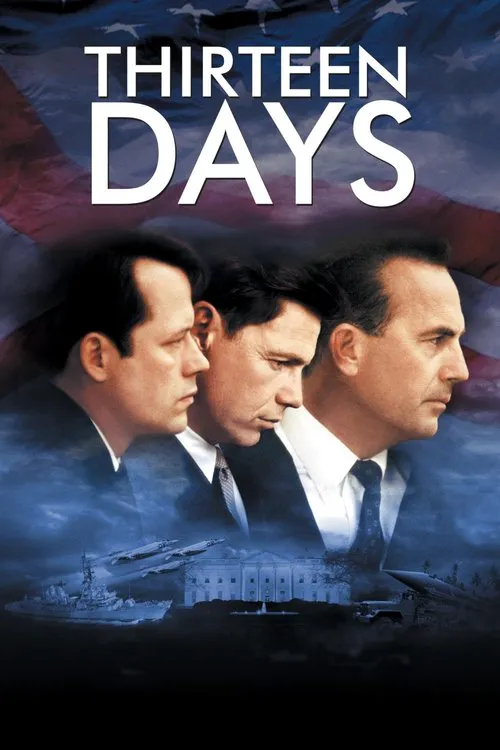Thirteen Days

Handlung
In 1962, the world stands on the precipice of nuclear war as the United States and the Soviet Union engage in a tense standoff known as the Cuban Missile Crisis. The events unfold like a ticking time bomb, with the fate of humanity hanging in the balance. Thirteen Days, directed by Roger Donaldson, dramatizes this pivotal moment in history, focusing on the inner workings of the Kennedy administration as they grapple with the implications of the Soviet Union's bold move. The crisis begins when a U-2 spy plane detects the construction of Soviet missile bases in Cuba, a mere 90 miles from American soil. The news sends shockwaves through the White House as President John F. Kennedy learns of the discovery. Initially, the president's advisors, including Attorney General Robert F. Kennedy, Secretary of State Dean Rusk, and Secretary of Defense Robert McNamara, advocate for a military invasion of the island to dismantle the Soviet buildup. However, Kennedy is aware that a war would spell disaster for the United States, with the potential loss of thousands of lives and the destruction of major cities. Instead, he proposes a blockade of the island, hoping to pressure the Soviet Union into withdrawing its missiles without resorting to a full-scale invasion. As the United States imposes a naval blockade around Cuba, the world holds its breath as the two superpowers engage in a high-stakes game of cat and mouse. Soviet ships approach the perimeter, and the Americans prepare for a potential confrontation. The Soviet Premier, Nikita Khrushchev, threatens to send bombers to Cuba, which would only serve to escalate the situation further. Throughout the 13-day crisis, Kennedy navigates a web of competing interests within his administration. His brother Robert, who has been tasked with coordinating the crisis effort, pushes for a more aggressive approach, hoping to prevent a repetition of the Bay of Pigs fiasco, where the CIA's botched invasion of Cuba had embarrassed the Kennedy administration. Meanwhile, Admiral William F. "Bull" Halsey, a seasoned naval officer, recommends a preemptive strike on the Soviet ships, in the hope that it might deter them from approaching the blockade. However, the president is aware that such an action could have disastrous consequences, drawing in both nuclear-armed nations and leading to catastrophic consequences. As the days tick by, tension builds between the United States and the Soviet Union. Radio operators at the White House are frantically typing out hasty messages, as diplomats work tirelessly to prevent a war. The air is thick with anticipation as both sides wait with bated breath for the other to blink. In the midst of this global crisis, Robert Kennedy forms an unlikely alliance with Soviet Ambassador Anatoly Dobrynin. The two men engage in back-channel negotiations, working to prevent a nuclear conflict. Dobrynin, sensing the gravity of the situation, conveys a message to the Soviet Premier: that a full-scale war would be catastrophic for the Soviet Union, and that a negotiated settlement is the only viable course of action. As the crisis reaches its climax, Kennedy and his advisors face an agonizing decision. The stakes are high; nuclear war hangs in the balance, and the fate of humanity is at risk. Kennedy, aware of the gravity of the situation, chooses to stand firm against the Soviet Union's demands. The Soviet Premier finally concedes to Kennedy's demands, agreeing to dismantle the missile bases in Cuba in exchange for a U.S. promise not to invade the island and the removal of a U.S. naval quarantine. On October 28, after 13 tense days, Kennedy announces that the crisis has been averted. Thirteen Days is a taut, gripping drama that captures the raw emotions and high stakes of the Cuban Missile Crisis. The film brings to life the men who held the fate of the world in their hands, as they navigated the treacherous waters of the Cold War. Through the eyes of the American officials, the movie gives a human face to the leaders who made the critical decisions that day. The film's focus on the human drama of the crisis serves as a poignant reminder of the devastating consequences of war and the importance of diplomacy in preventing catastrophe. The movie's title, Thirteen Days, serves as a poignant reminder of the narrow window of time when the fate of humanity hung in the balance. As the credits roll, the audience is left with a lasting impression of the gravity of the crisis and the courage of the leaders who stood up to the threat of nuclear war. In the end, the world comes closest to nuclear war, yet it is prevented through a combination of negotiation, reason, and bravery. Thirteen Days serves as a powerful reminder of the enduring power of diplomacy and the importance of standing strong in the face of overwhelming odds.
Kritiken
Empfehlungen




